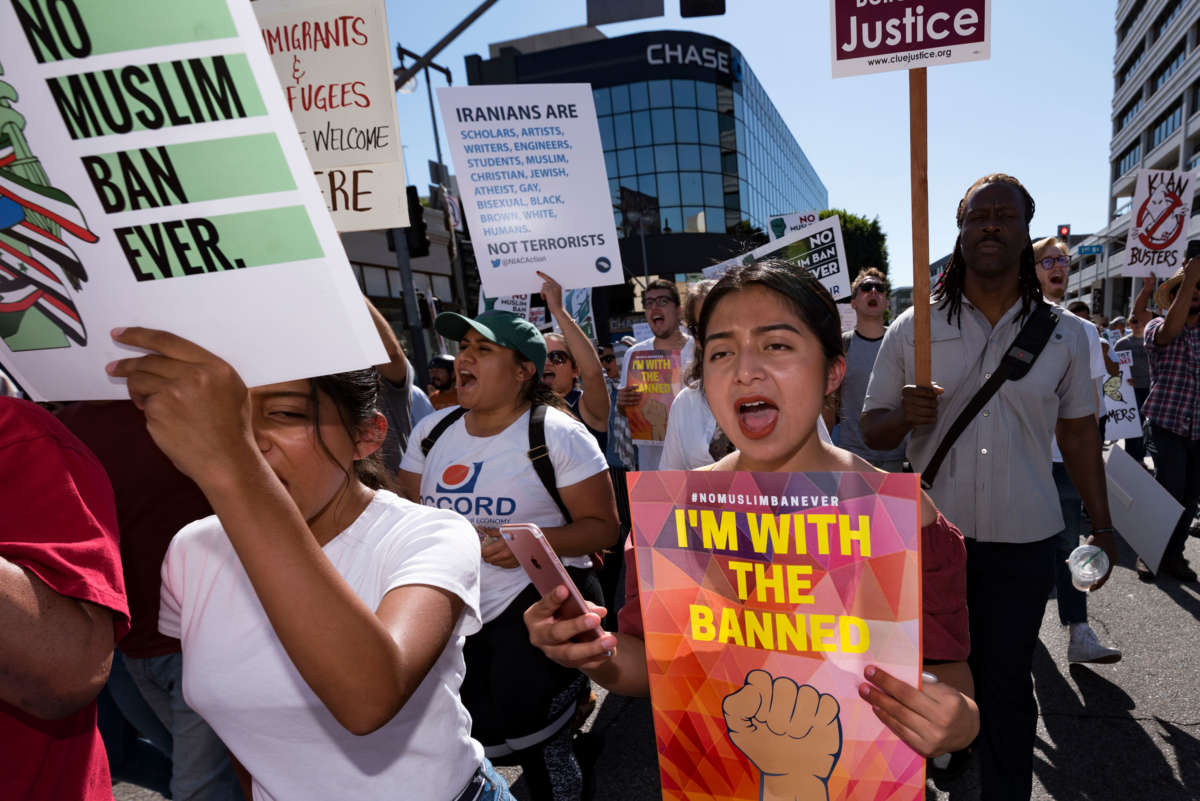Honest, paywall-free news is rare. Please support our boldly independent journalism with a donation of any size.
January 27 marks three years since President Trump issued the original Muslim Ban, which disrupted the lives of thousands of people around the world and triggered mass protests around the United States. Since then, the ban has been through three iterations, all of which have been met with legal challenges on the grounds that the policy was motivated by animus toward Muslims.
The policy now bars most people from five predominantly Muslim countries — Iran, Libya, Syria, Somalia, and Yemen. Despite the government’s claims that the ban was based on “national security” concerns, the true discriminatory and unconstitutional reasons behind it have been evidenced by, among other things, numerous anti-Muslim statements by Trump before and after he was elected.
In each version of the ban, multiple federal courts have agreed and ordered the policy stopped in its tracks. Some of these lawsuits remain ongoing, including one filed by the Brennan Center that is set for a hearing in federal appeals court on Tuesday. The government has appealed a district court judge’s rejection of its attempt to have the case dismissed, and the outcome could give us a chance to conclusively prove in court — and establish for the historical record — that the ban was the product of prejudice, not proof. This week’s argument before the Fourth Circuit Court of Appeals comes on the heels of President Trump’s confirmation that he plans to add new countries to the ban list.
So far, the most well-known case challenging the Muslim Ban is the one that the Supreme Court decided in June 2018. The Court ruled then that the third and most recent edition of the ban could take effect as lower courts considered whether it was appropriate for litigation to continue.
The decision in the case, Trump v. Hawaii, did not definitively affirm the ban’s legality or constitutionality. The justices were only reviewing a preliminary injunction that had been issued against the government. The injunction had put the policy on complete hold pending an ultimate decision on the merits.
Before the ruling, challenges to the ban asked courts to determine whether the government’s action was “for the purpose of disfavoring a religion.” Unfortunately, the Court ruled 5-4 that the president’s authority in the spheres of national security and immigration meant it needed to be deferential to the government. Going forward, plaintiffs would have to demonstrate that the ban could not be explained by anything other than anti-Muslim bias.
In October 2018, we refiled a lawsuit to do just that, representing six Muslim U.S. citizens and residents. In addition to the president’s anti-Muslim comments, we offered the court a substantial amount of public information that undermines the administration’s false story about the policy’s genesis as a national security need.
Last year in May, the federal district court in Maryland ruled that our case could proceed, noting that the we had put forward specific allegations to demonstrate that the ban “is not rationally related to the legitimate national security and information-sharing justifications” identified by the administration. The court also found it likely that the policy “was motivated only by an illegitimate hostility to Muslims.”
The Trump administration’s plan to expand the travel ban list to additional countries only serves to further undercut its bogus national security argument. That’s because the additions will reportedly be made on or near the exact date of the anniversary of the first ban. If people from these countries actually posed a security threat, the government would be taking action as soon as possible, not at a time that’s politically expedient.
Media that fights fascism
Truthout is funded almost entirely by readers — that’s why we can speak truth to power and cut against the mainstream narrative. But independent journalists at Truthout face mounting political repression under Trump.
We rely on your support to survive McCarthyist censorship. Please make a tax-deductible one-time or monthly donation.
